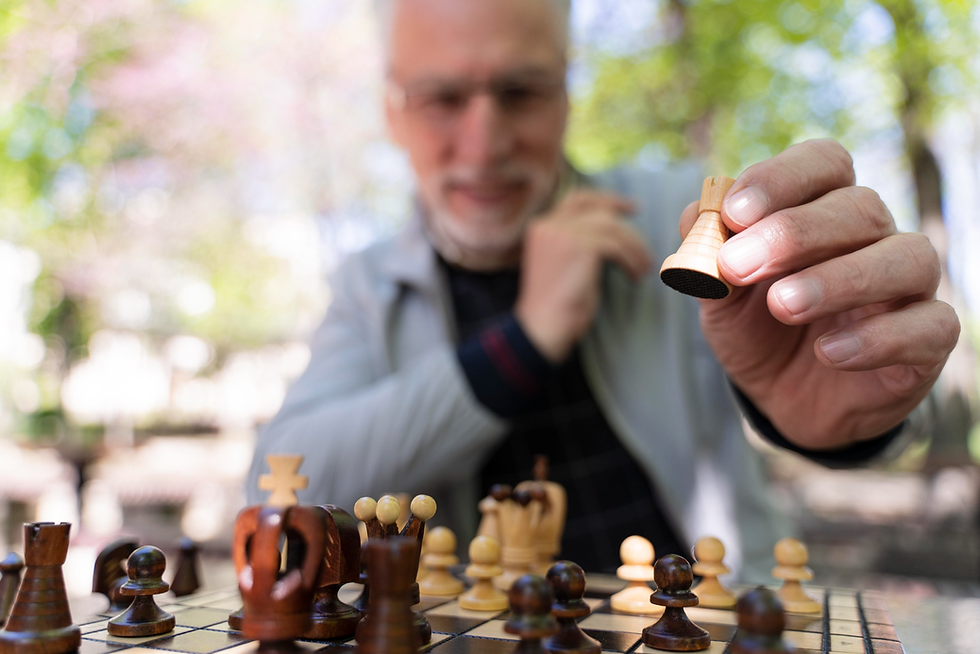Is a Personal Chess Coach Really Worth It?
- Jul 16, 2025
- 4 min read
Chess. Ancient, relentless, brilliant. For centuries, it has been more than a game—it’s been a battleground of minds. Whether you’re just getting your feet wet, fumbling through the opening moves, or you’ve logged thousands of hours navigating the 64 squares, one truth holds fast: growth never stops. But here’s the kicker—not all growth is equal.
Sure, you can grind games, binge puzzles, skim books—but none of that guarantees progress. Because sometimes, quality of practice crushes quantity. And that’s precisely where a personal chess coach enters the picture—not just as a guide, but as a catalyst.
The Importance of Personalized Chess Coaching
In theory, chess is objective. In practice, it’s personal.
What works wonders for one player may lead another astray. You might be a fearless tactician—razor-sharp in skirmishes, yet clumsy in closed positions. Or perhaps you’re positionally solid but collapse under time pressure.
Generic study paths won’t catch these nuances. YouTube can’t see your hesitation. Books don’t know where you get lost.
That’s where personalized coaching comes in—not as a crutch, but as a mirror held up to your exact style, your thought process, your game. It doesn’t offer one answer for everyone. It discovers your question and helps you solve your own version of chess.

How Online Chess Coaching Expands Your Options
In the past, private coaching meant proximity. Geography limited access. Today? That boundary is shattered. The digital age has brought masters from across the globe into your living room, often at the click of a mouse. No airfare. No time zones. No excuses. Just direct access to expertise, insight, and structured guidance that once felt like a luxury for elite players only.
Today, you have options like MM Chess Academy, where you can learn directly from a FIDE Master at home, without breaking the bank. Start with a trial and see if online lessons are for you.

One-on-One Attention and Feedback
One of the biggest advantages of having a coach is simple: feedback. A good coach doesn’t just show you theory—they study you. They recognize patterns in your decisions, detect gaps in your understanding, and highlight blind spots you didn’t even know existed. Maybe you’re a tactical whirlwind but collapse in endgames. Maybe your opening prep is fire, but your middlegame planning fizzles. Whatever it is, the coach sees it and tailors your training accordingly.
And the numbers? They speak volumes. According to FIDE, players who received personalized coaching improved their Elo by an average of 150 points in six months. Self-taught players? Just 40. That’s not a margin—it’s a landslide.
The Rise of Online Coaching
The explosion of online chess platforms didn’t just democratize the game—it revolutionized how we learn. Now, you can study under a grandmaster in Prague while sipping coffee in Bogotá. You can deep-dive into the Najdorf with someone who’s played it for two decades—or untangle complex endgames with a specialist who lives and breathes zugzwang.

Developing a Structured Learning Path
A Roadmap, Not Randomness
You wouldn't set off on a cross-country trip without a map. So why wander through your chess journey without one?
The personal coach will help you in every part of the game, but also where you are struggling the most, and that’s the real advantage. When you’re working on your own, it’s easier to miss the things that are actually holding you back. A personal coach picks up on those weaknesses and, through the personalized plan and preparation, you can learn and get better in those areas of the game.
This structure prevents that all-too-common chaos of self-learning: bouncing between YouTube videos, jumping openings, obsessing over traps instead of fundamentals. With a coach, everything connects.
Choosing the Right Coach
Choosing a chess coach isn’t about hiring the first GM you see. It’s about compatibility.
Experience: Does the coach play competitively? Do they have success coaching others? Their history matters—both over the board and as a teacher.
Specialization: If you’re mentally collapsing during must-win games, find someone who understands the psychology of chess. If you can’t navigate open positions, you want a positional wizard, not a blitz tactician.
Teaching Style: Some coaches are Socratic and interactive; others, methodical and detailed. Know how you learn best.
Testimonials: Real feedback from real students is gold. If multiple people say, “This coach helped me go from 1200 to 1700 in eight months,” that’s a green flag.
Your goal isn’t just to hire a coach. It’s to find a partner in progress.
Investing in Your Chess Future
Yes, coaching costs money. But think of it not as a bill, but as an investment. A good coach accelerates your progress, sharpens your instincts, and makes every hour of study count double. More importantly, they keep you accountable. You’ll stay motivated, consistent, and grounded in a plan. That alone is worth its weight in gold.
And what you gain isn’t just rating points. You’ll develop confidence. Joy. Mental discipline. A deeper love for the game.
In conclusion, if you’re serious about chess—not just casually dabbling, but truly hungry to grow—then a personal coach might just be the best move you’ve ever made. And in today’s online world, it’s more accessible than ever. Every session becomes a building block. Every insight, a stepping stone.



Comments